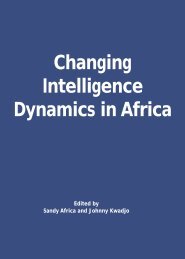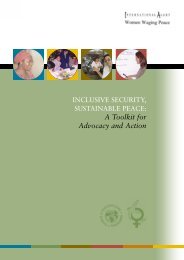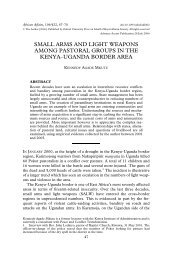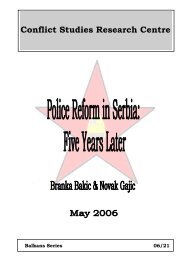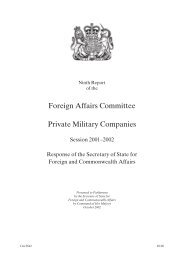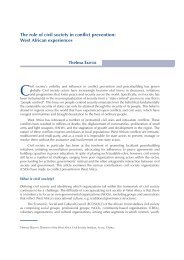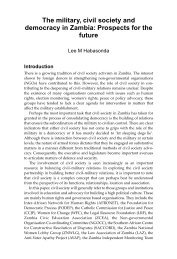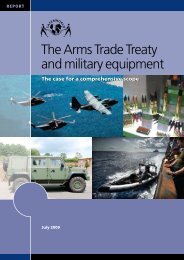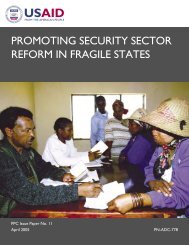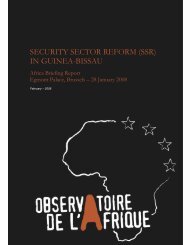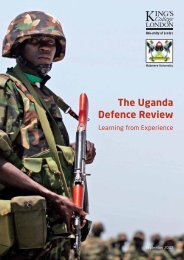AFGHANISTAN'S ELECTION CHALLENGES
AFGHANISTAN'S ELECTION CHALLENGES
AFGHANISTAN'S ELECTION CHALLENGES
Create successful ePaper yourself
Turn your PDF publications into a flip-book with our unique Google optimized e-Paper software.
Afghanistan’s Election Challenges<br />
Crisis Group Asia Report N°171, 24 June 2009 Page 27<br />
Operational planning and budget. Expertise,<br />
facilities and equipment built up for 2009 should<br />
be retained and decisions taken now to ensure that<br />
Afghan budget lines and donor commitments are<br />
in place for the bridge period and the 2010 polls.<br />
IEC reform. Even if the IEC Structure Law is not<br />
technically in place, the next president should<br />
submit IEC nominees to a vote by the Wolesi Jirga<br />
as soon as possible to build trust in the body.<br />
District council elections. Since these should be<br />
preferably held in 2010, urgent action is needed to<br />
delineate boundaries 199 and to link people to districts<br />
in the voter registry.<br />
The momentum after the 2009 elections must not be<br />
lost. The elections should be followed by a wideranging<br />
analysis of the process, feeding into a wider<br />
strategic review. Parallel to preparations for the 2010<br />
polls, a post-election strategy group of major ministries,<br />
donors, civil society representatives and electoral<br />
experts needs to ensure the creation of a permanent<br />
infrastructure and electoral framework. Decisions will<br />
need to be taken on:<br />
international rhetoric on the importance of building<br />
Afghan institutions and democratic norms with<br />
equivalent resolve. The aim should be substantive<br />
technical improvements in the 2010 polls and, more<br />
broadly, sustainable and widely accepted Afghan<br />
electoral institutions, with far greater support for the<br />
representative bodies in future. This second round of<br />
elections must not be a repeat of the first when “as<br />
soon as the election was finished there was no interest<br />
at all, they were conducted and forgotten”. 200<br />
Kabul/Brussels, 24 June 2009<br />
Electoral calendar. This needs to be sustainably<br />
consolidated and clearly laid out for the future.<br />
Legal framework. The laws governing the political<br />
system need to be comprehensively reviewed<br />
with wide-ranging public consultation, including<br />
over the most appropriate electoral system, the future<br />
of the ECC, and the role of political parties.<br />
Voter registry. Data collected to date needs to be<br />
thoroughly reviewed and decisions taken on how<br />
best to proceed with linking voters to polling centres<br />
and creating robust voter lists. How and<br />
whether to tie this in with other data collection exercises<br />
such as a voter registry or census needs to<br />
be considered.<br />
Embedded funding. Planning needs to match<br />
available resources bearing in mind that the Afghan<br />
government will be assuming an increasing<br />
proportion of operational costs. Donor commitments<br />
will still be required and where possible<br />
should be multi-year and conditional upon decisions<br />
taken on meaningful electoral reforms.<br />
The enormous international resources and attention<br />
now focused on elections after years of inaction must<br />
be used to drive ongoing improvements, matching<br />
199 “Disputes over constituency boundaries shall be raised no<br />
later than 170 days before the election date. Article 12 of the<br />
Electoral Law (2005).<br />
200 Crisis Group interview, Afghan electoral official, Kabul,<br />
2009.



